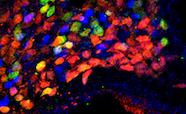Our research is being conducted across a wide range of different disorders and is using different approaches, from population health to biomedical understandings.
Centre for Neuroendocrinology
 We study how the brain controls hormones in the blood, and how these hormones can regulate the brain's activity. Our specialist expertise in fertility, reproduction, and body weight is at the forefront of global neuroendocrinology research. Formed in 2003, the Centre for Neuroendocrinology (CNE) presently comprises 10 collaborative research groups making it the largest cluster of neuroendocrinologists in the Southern Hemisphere.
We study how the brain controls hormones in the blood, and how these hormones can regulate the brain's activity. Our specialist expertise in fertility, reproduction, and body weight is at the forefront of global neuroendocrinology research. Formed in 2003, the Centre for Neuroendocrinology (CNE) presently comprises 10 collaborative research groups making it the largest cluster of neuroendocrinologists in the Southern Hemisphere.
Postpartum mood disorders
Dr Rosie Brown of the Grattan Laboratory, investigates postpartum mood disorders. She has just been awarded a $500,000 Hercus Health Fellowship by HRC. Dr Brown says the Fellowship will allow her to broaden her research to look at the role the hormone prolactin plays in the reward circuitry of the brain and its impact on how a mother cares for her infant after birth.
The research has important implications for understanding how the brain regulates mood and behaviour during pregnancy and in the early postpartum period. By understanding these pathways, Dr Brown hopes it could lead to the development of more effective diagnostic tools and strategies to treat those that suffer from postpartum mood disorders.
Email rosemary.brown@otago.ac.nz
Web otago.ac.nz/neuroendocrinology/research/dave-grattan.html
Christchurch Health and Development Study
 The Christchurch Health and Development Study (CHDS) has been in existence for over 40 years. During this time we have followed the health, education and life progress of a group of 1,265 children born in the Christchurch (New Zealand) urban region during mid-1977.
The Christchurch Health and Development Study (CHDS) has been in existence for over 40 years. During this time we have followed the health, education and life progress of a group of 1,265 children born in the Christchurch (New Zealand) urban region during mid-1977.
Current research objectives:
- Alcohol and cannabis use in the CHDS cohort
- Psychosocial and functional impairment resulting from mental disorders over the life course
- The long-term psychosocial impact of exposure to maltreatment in childhood
- The interplay between genes, environment and mental disorders
- The psychosocial consequences of a major disaster (the Canterbury Earthquakes) in the CHDS cohort
- Te Ao Māori perspective: the use of He Awa Whiria (a Braided Rivers model) to examine the CHDS data from both Western Science and kaupapa Māori perspectives
- The development of translational applications of research findings from the CHDS to contribute to policy development, implementation and evaluation
- The links between personality traits and adult psychosocial functioning
- The transitions to menopause for women aged 40
- Psychosocial factors associated with obesity
Risk factors
Professor John Horwood has research interests in psychosocial adjustment in young adolescence including consequences of drug use, the Canterbury earthquakes, and preterm birth.
Associate Professor Joseph Boden investigates the psychosocial causes and consequences of substance use, abuse, and dependence, mental health and substance use epidemiology, and the social and psychological determinants of maladaptive behaviour including aggression and violence.
Email chds.uoc@otago.ac.nz
Web otago.ac.nz/christchurch/research/healthdevelopment/research/
Department of Nursing
 The Department's research focus is on improving clinical outcomes for people with long-term, acute and complex conditions. Within this overarching focus our research involves interventions for the management of long-term conditions such as diabetes and bipolar disorders, women's health needs and for people with intellectual disability.
The Department's research focus is on improving clinical outcomes for people with long-term, acute and complex conditions. Within this overarching focus our research involves interventions for the management of long-term conditions such as diabetes and bipolar disorders, women's health needs and for people with intellectual disability.
Email sandra.scannell@otago.ac.nz
Web otago.ac.nz/christchurch/departments/nursing/research/
Department of Psychological Medicine, University of Otago, Christchurch (UOC)
 The Department of Psychological Medicine in Christchurch has two major streams of research:
The Department of Psychological Medicine in Christchurch has two major streams of research:
- Clinical Research
- Health and Development Study
Clinical Research
The Clinical Research Unit (Mental Health) has an established platform of research projects related to improving treatments and outcomes for those with serious mental health disorders.
Current research activities and thesis opportunities
Addiction and co-existing disorders
Professor Doug Sellman, Associate Professor Simon Adamson, Associate Professor James Foulds
Anxiety disorders and treatment
Professor Caroline Bell, Dr Ben Beaglehole, Dr Jenny Jordan
Eating disorders
Professor Lois Surgenor, Dr Jenny Jordan
Family interventions in mood disorders
Dr Maree Inder, Dr Dave Carlyle
Improving functioning in mood disorders
Professor Marie Crowe, Professor Richard Porter, Research Associate Professor Katie Douglas, Dr Maree Inder
Māori mental health
Professor Cameron Lacey
Neurocognitive interventions for mood disorders
Professor Richard Porter, Research Associate Professor Katie Douglas
Personality disorders and treatment
Professor Roger Mulder, Dr Dave Carlyle
Psychological adaptation to medical illness
Professor Lois Surgenor
Psychological consequences of disasters and trauma
Professor Caroline Bell, Dr Ben Beaglehole, Professor Richard Porter
Psychotherapy for mood disorders
Professor Marie Crowe, Dr Jenny Jordan, Dr Maree Inder
The experience of and recovery from psychiatric disorders
Professor Marie Crowe, Dr Dave Carlyle
Projects
A family intervention for mood disorders
Project funded by the Gamma Foundation.
Investigators: Maree Inder, Dave Carlyle, Marie Crowe, Richard Porter
First-episode psychosis in Māori
Project grant funded by Rangahau Hauora Māori ( HRC ).
Investigators: Cameron Lacey, Suzanne Pitama, Ruth Cunningham, James Stanley, Sue Crengle, Richard Porter, Marie Crowe
Inpatient Activation Therapy for Depression
Project grant funded by HRC .
Investigators: Richard Porter, Katie Douglas, Marie Crowe, Jenny Jordan
Intensive Rhythm Therapy for Treatment-resistant Bipolar Disorder
Feasibility grant funded by HRC .
Investigators: Richard Porter, Marie Crowe, Katie Douglas, Maree Inder
Māori and Bipolar Disorder
Project grant funded by Rangahau Hauora Māori ( HRC ).
Investigators: Cameron Lacey, Suzanne Pitama, Ruth Cunningham, James Stanley, Jo Baxter, Sue Crengle, Roger Mulder, Richard Porter, Marie Crowe
Patients' experiences of the functional effects of mood disorders
Project funded by NZ Lotteries.
Investigators: Marie Crowe, Katie Douglas, Maree Inder, Hayley Wells
Psychotherapy and Cognitive Enhancement for Depressive Disorders
Hercus Fellowship funded by HRC .
Investigators: Katie Douglas, Richard Porter, Marie Crowe
Transdiagnostic group cognitive behavioural therapy for depression and anxiety in primary care
Feasibility grant funded by HRC .
Investigators: Caroline Bell, Richard Porter, Jenny Jordan
Translating Social Rhythm Therapy into Community Mental Health Services
Feasibility grant funded by HRC .
Investigators: Richard Porter, Marie Crowe, Maree Inder
Projects in development
- Psychological effects of the March 15 Mosque attacks
- Role of Cytokines in Bipolar Disorder
- Tele-Interpersonal and Social Rhythm Therapy for mood disorder
Email judith.stone@otago.ac.nz
Web otago.ac.nz/christchurch/departments/psychmed/research/
Department of Psychological Medicine, Dunedin School of Medicine (DSM)
Our collaborative research philosophy draws on the clinical and academic skills of the Department's psychiatrists and clinical and health psychologists with the overarching aim to improve mental health and the treatment of mental disorders, and to better understand how psychological factors influence physical health.
Our research projects are wide-ranging and fall within six main themes:
- Clinical psychiatry
- Health and medical psychology
- Mental disorders
- Psychopharmacology
- Sexual health and sexual harm
- Suicide prevention
Mental health epidemiology
Professor Kate Scott is a psychiatric epidemiologist and senior investigator in the World Health Organization's World Mental Health (WMH) Surveys Initiative, a coordinated series of household epidemiologic surveys of mental disorders in over 30 countries around the world. Her interests are in cross-national psychiatric epidemiology, the inter-relationship between mental and physical disorders, and gender differences in mental disorders.
Mental health disorders
Professor Paul Glue's research focuses on clinical and basic science. His areas of interest include the pharmacology of drug treatments in psychiatry and the investigation of disease mechanisms in neurological and psychiatric disorders.
Dr Chris Gale's research includes a focus on evidence based treatments for the common mental disorders.
Risk factors
Dr Sarah Fortune is an academic clinical psychologist with an enduring clinical and research interest in suicide prevention, and adolescent self-harm.
Dr Charlene Rapsey is a clinical psychologist who among her interests investigates childhood adversity as a risk factor for mental health.
Associate Professor Tess Patterson's research interests are in applied clinical and forensic psychology domains including childhood sexual abuse, harmful sexual behaviour and sexual offending, and alcohol and drug treatment outcomes.
Health and medical psychology
Associate Professor Nicola Swain investigates health psychology which focuses on how psychological and behavioural factors influence physical health, with the range of topics including chronic pain management, aggression and violence in healthcare, applications of mindfulness, and issues for carers.
Dr Maria Kleinstäuber is a Clinical and Health Psychologist with research interests in behavioural medicine interventions and medically unexplained symptoms.
Late-life psychiatric disorders
Associate Professor Yoram Barak is a Psychiatrist and Consultant Psychogeriatrician. Associate Professor Barak's research interests include multiple sclerosis, cancer, a wide range of psychiatric conditions (such as depression, schizophrenia, and obsessive–compulsive disorder), old-age psychiatry, and suicide.
Email psychological-medicine@otago.ac.nz
Web otago.ac.nz/dsm-psychmed/research/
Department of Psychological Medicine, University of Otago, Wellington (UOW)
 Associate Professor Giles Newton-Howes is a general adult consultant psychiatrist with a sub-specialty in substance-misuse psychiatry. His research interests include the clinical understanding of personality disorders, particularly as they relate to psychiatric patients and mental-state disorder. He is also interested in the interface between psychiatry and society, particularly the application of coercive practices.
Associate Professor Giles Newton-Howes is a general adult consultant psychiatrist with a sub-specialty in substance-misuse psychiatry. His research interests include the clinical understanding of personality disorders, particularly as they relate to psychiatric patients and mental-state disorder. He is also interested in the interface between psychiatry and society, particularly the application of coercive practices.
World of Difference is a new service-user research group focused on ending discrimination, and promoting recovery, inclusion, and respect for the human rights of people who experience mental distress, led and delivered by experts with personal experience. It is led by Associate Professor Sarah Gordon.
Our research programmes are configured around several themes relevant to mental health practice in the New Zealand setting:
- Physical health of people with mental illness, including obesity and sleep
- Mental health service delivery and evaluation, including in primary care and secondary care
- The interface between psychological and physical health
- Social psychiatry and psychiatric epidemiology
- Suicide
- Service user-led and co-produced research and teaching (World of Difference project)
- Personality and its role in mental illness
- Education in the clinical professions
- Addictions
- Mental health law
- Stigma and discrimination
Email kristy.wilson@otago.ac.nz
Web otago.ac.nz/wellington/departments/psychologicalmedicine/research/
General Practice Research Group, (UOC)
 Professor Dee Mangin leads the Christchurch General Practice Research Group which focuses on clinical research, where the results can be directly translated into clinical practice.
Professor Dee Mangin leads the Christchurch General Practice Research Group which focuses on clinical research, where the results can be directly translated into clinical practice.
The two central research themes underpinning this are rational use of medicines and innovative models of primary care.
Relevant research projects:
- Selective serotonin reuptake inhibitors (SSRI) study: Stable primary care depression: maintenance vs gradual withdrawal of fluoxetine
- Legacy drug prescribing patterns in primary care: Investigating the potential of legacy prescribing to contribute to unnecessary polypharmacy
Email generalpractice.uoc@otago.ac.nz
Web otago.ac.nz/christchurch/research/generalpractice/
Māori Indigenous Health Innovation (MIHI)
 Māori Indigenous Health Innovation (MIHI) undertakes and supports research that explores Māori health inequities and building excellence in research evidence that contributes to Māori health advancement.
Māori Indigenous Health Innovation (MIHI) undertakes and supports research that explores Māori health inequities and building excellence in research evidence that contributes to Māori health advancement.
Māori mental health is a priority area within Māori health. Professor Suzanne Pitama and Professor Cameron Lacey have clinical backgrounds in this field, which supports a desire to contribute to this area of research. Dr Lacey's research interests include access to health services for Māori with bipolar disorders.
Other MIHI research interests include:
- Stress cardiomyopathy and earthquakes
- Epilepsy and depression
- Broad mental health kaupapa
- Broader Maori Health kaupapa
Email mihi.uoc@otago.ac.nz
Web otago.ac.nz/christchurch/research/mihi/
School of Pharmacy
 The School of Pharmacy is committed to caring for our communities through:
The School of Pharmacy is committed to caring for our communities through:
- Excellence in education and development of the pharmacy workforce
- Excellence in research into pharmaceuticals and healthcare
- Translating our research into practical knowledge and products that improve the health of our communities
Clinical pharmacy is the area of pharmacy concerned with patient care and the optimisation of medicine use in order to promote health and wellness, and prevent disease.
Predicting response to drug treatments
Professor Bruce Russell investigates biomarkers that enable the prediction of a response to treatment for severe mental health disorders. His research focuses on investigating the psychopharmacology and underlying pathophysiology of the severe mental illnesses such as schizophrenia with an emphasis on treatment-resistance. He aims to discover biomarkers that will enable the prediction of an individual's response to drug treatment. He also has an active interest in the psychopharmacology of both new and old recreationally-used drugs and the mechanisms underlying drug addiction.
Email pharmacy@otago.ac.nz
Web www.otago.ac.nz/pharmacy/research/clinical-pharmacy
Suicide and Mental Health Research Group – Te Rōpū Rangahau i te Mate Whakamomori me te Hauora Hinengaro
The Suicide and Mental Health Research Group is a multi-disciplinary team of researchers and clinicians. It contributes to knowledge, policy, and services by conducting high quality research in suicide prevention, mental health and illness.
Research students are important contributors to the research group and we currently support a number of PhD students. In the last five years publications from the group have focused on suicide and self-harm, and management of mental health care in primary care.
Research Associate Professor Gabrielle Jenkin's training is in public health and social science methods. She supervises a number of PhD students in suicide research and mental health services research. She is currently the PI of a multidisciplinary Marsden funded research project to investigate the design, philosophy and social regime of adult acute mental health wards in New Zealand.
Dr Sarah McKenzie received a Marsden Faststart grant to investigate men's mental health using visual methods. This multidisciplinary study will provide the first in-depth gender analysis of how dominant ideas about 'how to be a man' in New Zealand society impact on young men's mental health, leaving some at far greater risk of taking their own lives.
Email sarah.mckenzie@otago.ac.nz
Web otago.ac.nz/wellington/research/smhrg/research